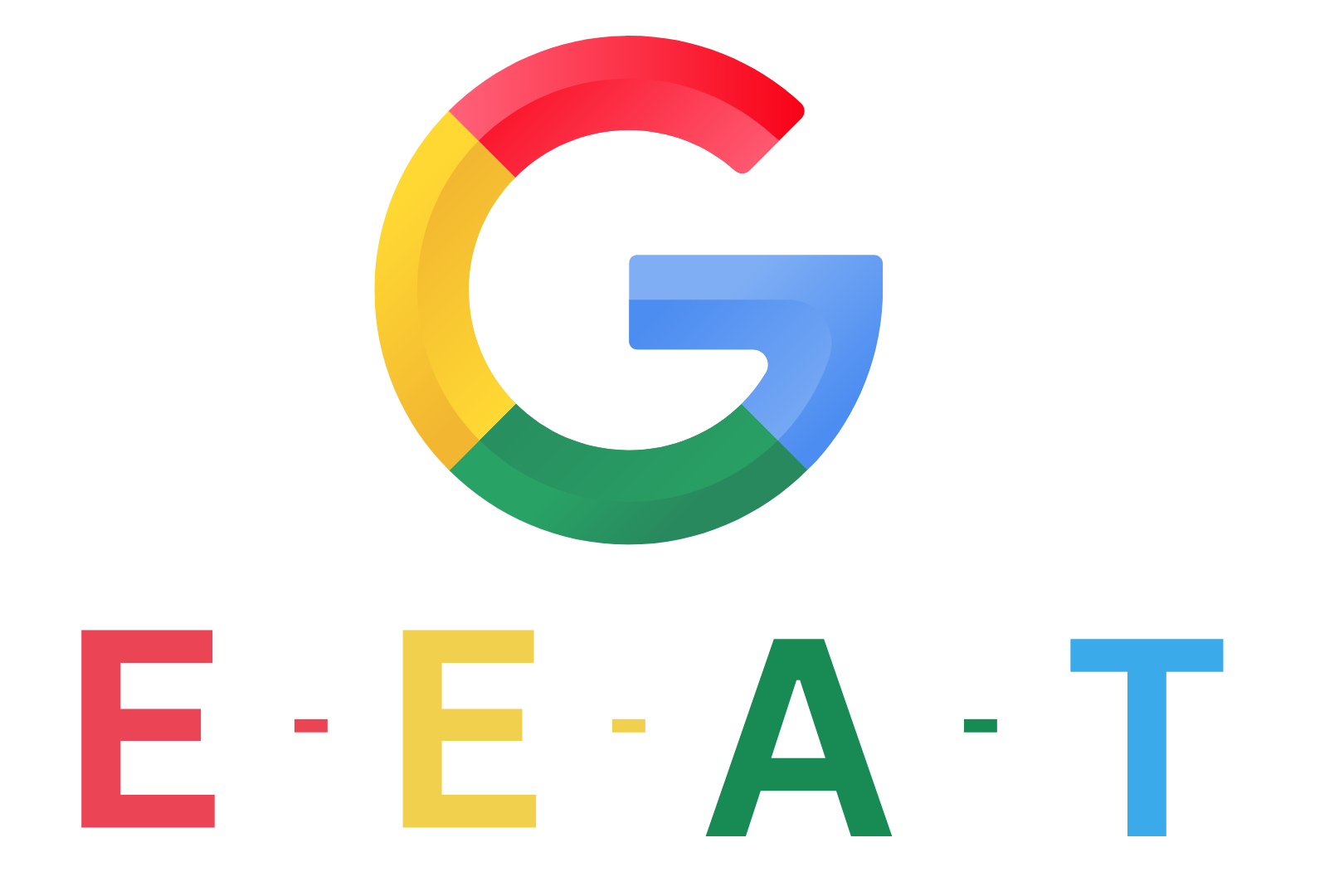We live in a world of unprecedented technological change. Only a few years ago, mobile and voice search was the next new frontiers in SEO, and today, it’s AI. Tomorrow will be the quantum computing revolution, and after that, we might all just be hooked up to computers that can search using our thoughts.
The lesson for businesses that want to outrank the competition and get a leg up is always to stay ahead of the technological curve.
One massive paradigm shift we’re already seeing take place is not just the acceptance of search engines to employ AI but also of users turning to AI for search.
Using popular platforms like ChatGPT, millions of online users now use AI-based chatbots and search engines to get answers to their questions in the blink of an eye without having to search through multiple results.
However, this doesn’t mean SEO’s days are numbered. On the contrary, both AI-based search engines and chatbots still rely on traditional search indexes and SEO signals to determine rankings and citations for content.
Following many of the same best practices and some tips specifically designed for AI, you can dominate this new channel of search that your competitors are bound to take years to discover. Let’s dive in.
How ChatGPT Search Results Work
ChatGPT’s newest model 4o can now search through a wider database across the web to come up with answers for user queries in the same way as a traditional search engine. In addition to ChatGPT 4’s static database and Bing’s index, ChatGPT 4o and o1 can search even further, pulling links from across the web that are verified based on internal ranking algorithms.
At the moment, citations are only shown for specific searches or when the user requests them. For example, users can conduct specific local searches inside ChatGPT to get the same information as they would a search engine.
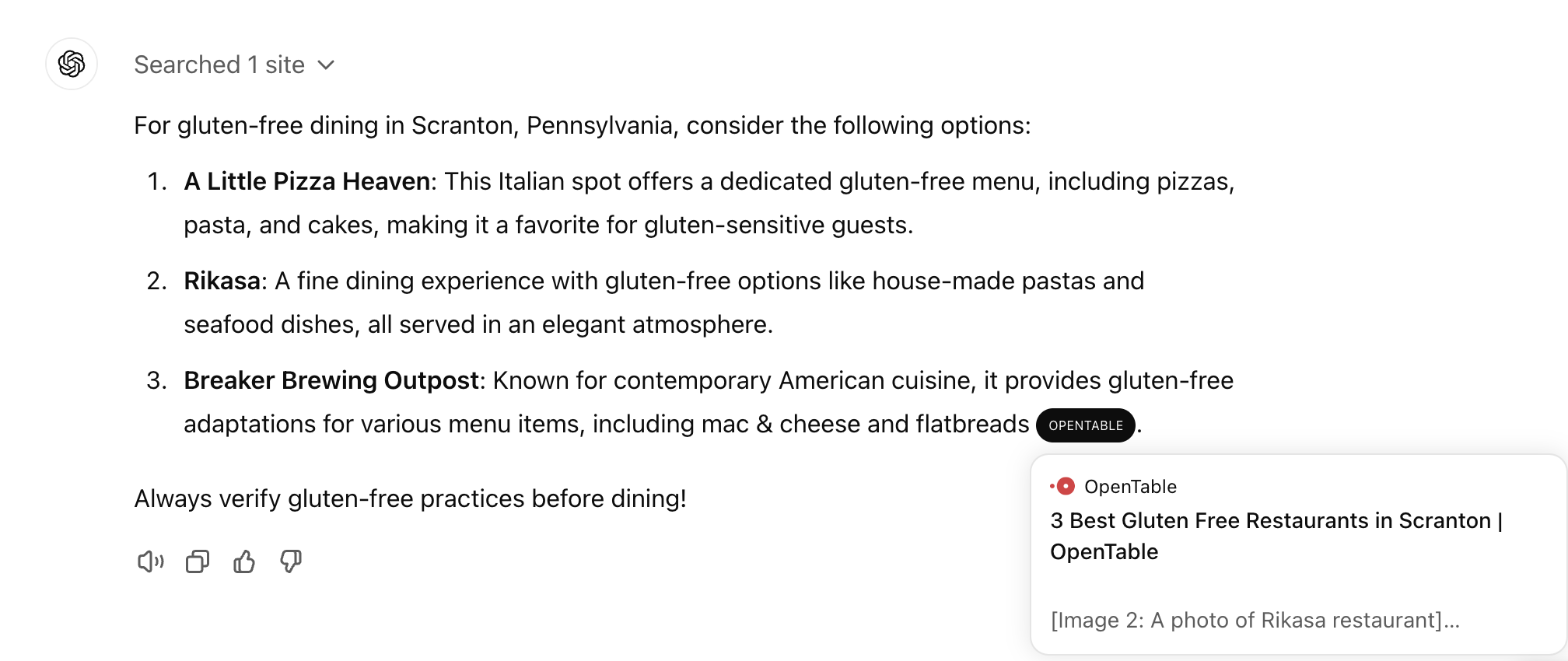 In its current rudimentary stage, ChatGPT’s citations are fairly limited to websites that it deems trustworthy and authoritative. However, this means that there is an even easier opportunity to rank for these results with limited competition available.
In its current rudimentary stage, ChatGPT’s citations are fairly limited to websites that it deems trustworthy and authoritative. However, this means that there is an even easier opportunity to rank for these results with limited competition available.
Google And Other Other AI-Based Search Engines to Keep An Eye On
ChatGPT is by far the most widely known AI chatbot on the market, but other AI-based search engines have begun to crop up in recent years, and many popular platforms–from Google to Adobe–incorporate AI strongly into their core toolset.
Currently, Google runs an experimental AI-Overview search results tab, which combines information from multiple websites to generate quick answers to user queries.
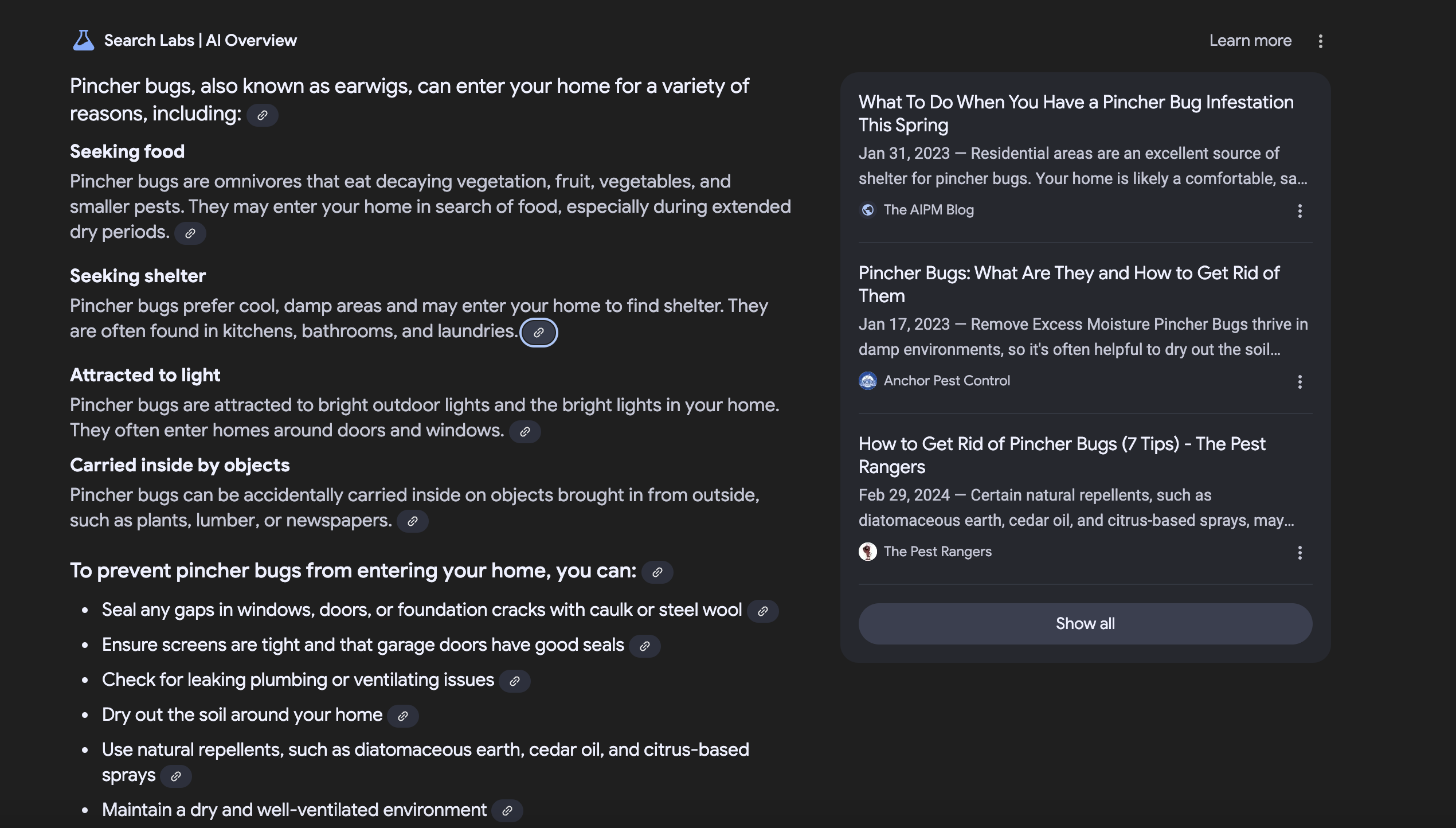 These results are very similar to featured snippets and People Also Ask tabs; however, these results take prominence in any search they are featured in, making them arguably more valuable than a top blue link. You can actually see what keywords rank for AI-based results on Google in SEMrush.
These results are very similar to featured snippets and People Also Ask tabs; however, these results take prominence in any search they are featured in, making them arguably more valuable than a top blue link. You can actually see what keywords rank for AI-based results on Google in SEMrush.
 With millions of people enabling AI-based search and over 60% finding the change positive, more users are expected to embrace AI-based search engines in the coming years.
With millions of people enabling AI-based search and over 60% finding the change positive, more users are expected to embrace AI-based search engines in the coming years.
Other AI-based search engines, like Perplexity, already have tons of users and combine citations with AI-generated results for a fast and user-friendly search experience.
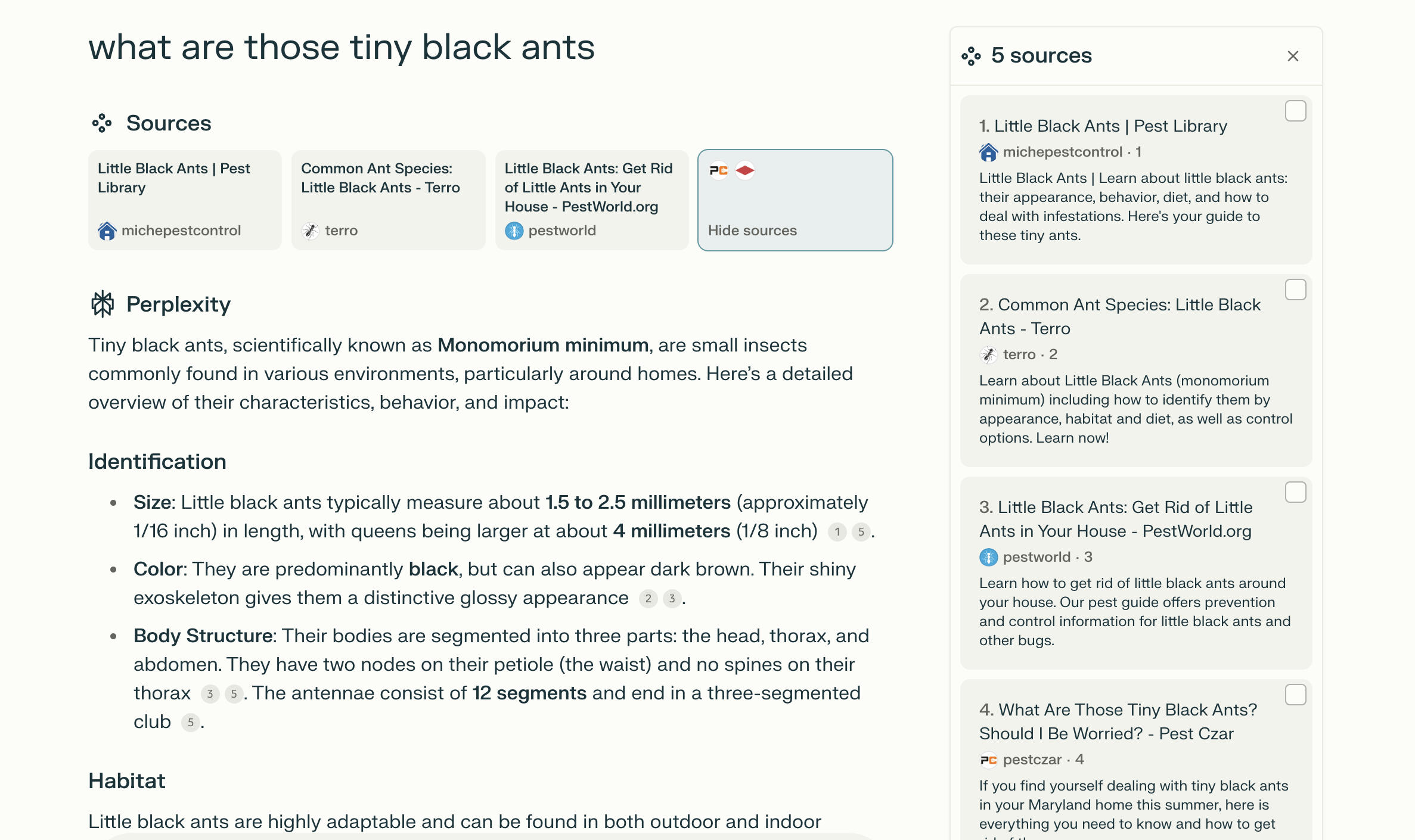 Be on the lookout for platforms like this, as a record number of people have recently expressed dissatisfaction with Google.
Be on the lookout for platforms like this, as a record number of people have recently expressed dissatisfaction with Google.
How to Rank for AI-Based Generative Results
Understanding the shift to AI taking place, it’s never been more important than ever to optimize your website to rank for AI-based results. The good news is that many of the old SEO best practices still apply, but with some light changes to make it more AI-search-friendly.
1. Follow E-E-A-T Guidelines
In terms of SEO best practices, following E-E-A-T guidelines is a good practice for ranking in traditional and AI-based searches.
- Experience: Content is created by somebody with first-hand experience of the subject. This is where having an author tag with multiple articles under your name or user-generated content becomes so valuable.
- Expertise: Possessing proper credentials in certain fields will be looked at by search engines when ranking certain types of content.
- Authoritativeness: Similarly, having an author tag with multiple articles demonstrating deep technical knowledge of a subject will make you an expert. Links and citations from other sources will also be valuable in providing social proof of expertise.
- Trust: Possessing clear information about your business or brand, including your name, address, and phone number (NAP), as well as a sound technical website free of spam, will be key in establishing trust.
2. Implement Author Tags and Author Signals on Your Website
We cannot stress this enough, especially when it comes to chatbots like ChatGPT. It’s no secret that Google already ranks authors based on expertise and authority. And this directly translates into higher rankings.
In our research, we’ve found that many of the citations found on ChatGPT have been from larger websites with established credibility and smaller ones with established authorship.
Implementing an author tag–even if it’s just the website or business owner–and putting content under that tag will be an authority for that author and anything they write. Research also shows that having that author’s social media linked on those blogs helps send stronger signals to ChatGPT, which helps them rank what content to use in their search.
For example, our founder also spent over 15 years creating his personal brand in the motorcycle industry. He recently took a stake in Twisted Road, a motorcycle rental company, and creates content on their blog.
Once his author tag was added to the Twisted Road website, various pieces of content began showing up across ChatGPT (and Google’s Generative AI!).
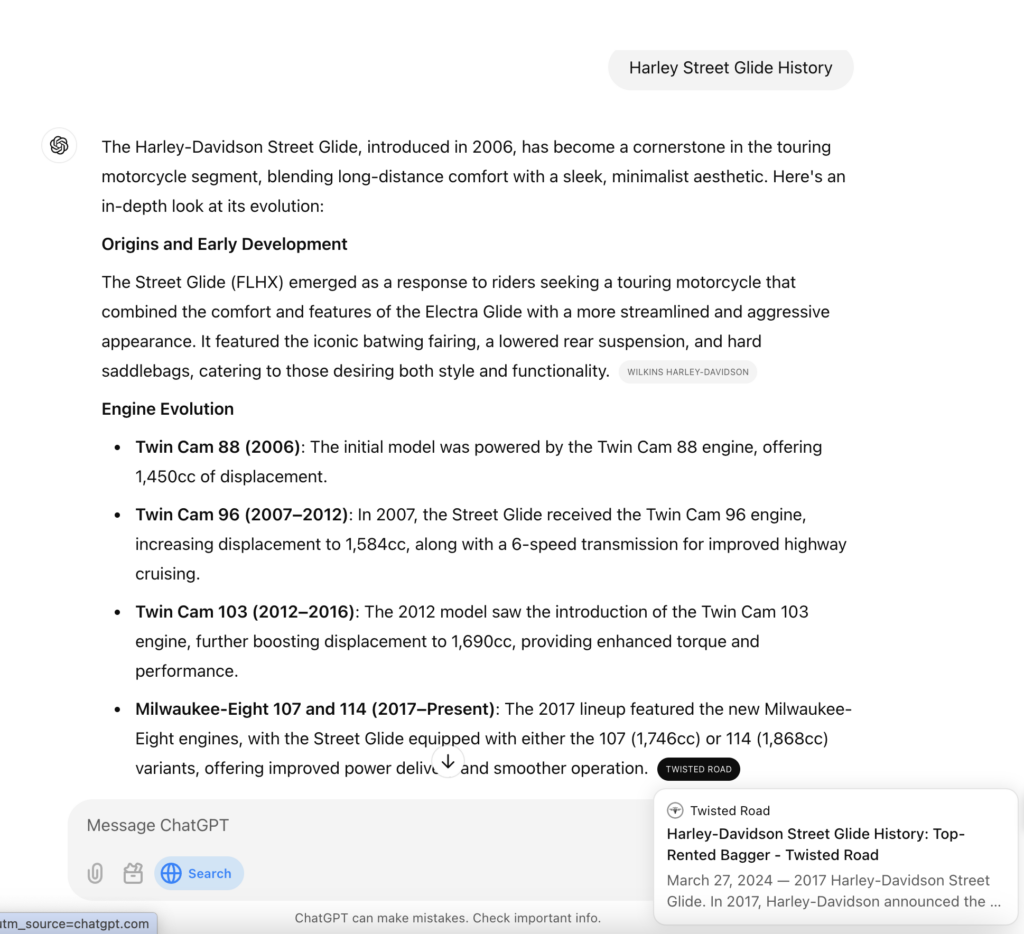

3. Create Clear Information Structures
Like search engines, AI-based crawlers need to be able to parse through vast amounts of information and organize them into legible and accurate content.
By organizing your site’s information hierarchy, including using top-navigation links, headers, and relevant metadata (such as meta titles and descriptions), you can communicate what your content is about and where crawlers can find the right information.
4. Create a Robust Backlink Profile for Your Website
As we previously mentioned, backlinks demonstrate authority and are a huge part of Google’s existing algorithm. Platforms like ChatGPT and Perplexity also take backlinks into consideration when ranking content, whether directly via other sites it trusts in its index or indirectly by taking what already ranks in Bing or Google’s index to parse its results.
5. Write for Specific User Intent
Writing for AI-based results is very similar to optimizing your site for a featured snippet. In particular, you want to provide clear and concise answers to user queries that match their intent.
One of our favorite tactics is to provide FAQs on all content pages to provide quick answers that match other related keyword searches we’ve uncovered in our research.
For commercial intent searches, make sure to follow the other tips we listed above to help your site get cited for these queries.
6. Optimize for Natural Language Processing
Chatbots like ChatGPT are pretty adept at understanding the semantic structures of sentences, which is why we recommend writing in a natural tone that is easy to understand. This involves not making concepts or words too complicated or stuffing too many keywords into sentences that would make it hard to understand.
Likewise, proper grammar and editing are also very important.
7. Continue to Monitor Changes in the Industry to Stay Ahead
Finally, as we opened this blog by mentioning, the world is changing pretty fast, and the companies that succeed in this era of unprecedented change are the ones that look toward the future.
While ChatGPT and Perplexity may not have the weight that Google does, in the next couple of years, you may wish that you had invested sooner in ranking for generative AI.
Continue to monitor changing algorithms, new platforms that enter the space, and any helpful advice/training you can collect along the way.
The future is here–are you ready to embrace it?


